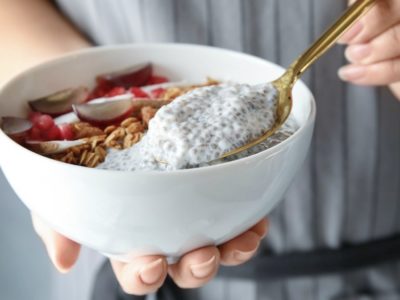Table of Contents[Hide][Show]
Who doesn’t like guacamole, salads, and avocado toast? If you’re an avocado fan, it’s not difficult to find a well-loved recipe you can make with it. In fact, you could easily eat an avocado a day if you were in the mood.
And that’s not necessarily a bad thing. Avocados have long been known as a superfood, since they’re a good source of nutrients and antioxidants your body needs.
But beyond its general benefits for your health, do you know how avocados affect your gut health? Let’s take a deeper look at this tasty fruit and its effects, positive and negative.
What Is Gut Health?
Before we dive into how avocados affect your gut, let’s explore how the health of your gut affects your body—starting with bacteria.
Your body is home to millions of bacteria and trillions of microorganisms. They live in your nose, on your skin, in your ears, and, most of all, in your gut. Yes, you read that right—your gut is filled with bacteria!
There are two types of bacteria that live in your gut.
- Probiotics are the good (beneficial) bacteria. You need these to stay healthy. Probiotic bacteria support your digestive system and boost your immune response.
- Pathogens are the bad bug guts. They can lead to illness and disease, suppress your immune system, and generally throw your body off-balance.
Both types of bacteria live in your gut at the same time, in an environment called the gut microbiome. Because space is limited, the probiotics and pathogens are in a constant duel to see which colony will tip the balance in their favor.
In an ideal gut microbiome, your good bacteria will be present in larger quantities. And because there’s only so much room in your gut, this will crowd out and hinder the growth of the bad bacteria.
Why Is a Healthy Gut Important?
The condition of your gut is crucial to your overall health. In fact, study after study have proven that a healthy gut will produce a positive physical and mental impact on your body.
Unfortunately, most of us don’t have a balanced gut. Instead, for most people, the bad bacteria outnumbers the good bacteria, a condition known as dysbiosis. In fact, each year 62 million Americans are diagnosed with digestive issues stemming from an imbalanced gut!
Being in dysbiosis can create a number of issues in your body.
- The bacteria in your gut can heighten neurological disorders, including Autism Spectrum Disorder, ADD and ADHD, schizophrenia, and bipolar disorder.
- Serotonin, a mood/sleep hormone, is produced in the gut. If you experience unusual mood swings or have trouble sleeping, it could be caused by a gut imbalance!
- Digestive orders such as diarrhea, bloating, gas and other symptoms are a sign of bad bug guts.
- Skin conditions such as acne and eczema can also be a sign of an imbalance in gut bacteria.
And if all that’s not enough, your gut also affects your immune response! Believe it or not, 70-80% of your immune system is actually housed in your gut. When your gut is out of whack, your immune system is weakened. You’ll find it more difficult to fight off infections, colds, or anything else that attacks your system.
So how can you avoid a gut imbalance? One of the most effective methods is eating gut-friendly, probiotic-boosting healthy foods, such as avocados.
Related
What is the Gut-Brain Axis?
Learn how the connection between the gut and brain—the gut-brain axis—influences your mental and digestive health and how you can support both simultaneously through the foods you consume.
The Relationship Between Avocados and Gut Health
Previous studies into the health benefits of avocados focused on weight loss, vitamin consumption, and increased fiber. But more recent studies are showing that eating just one avocado a day can greatly improve your gut health.
The main way in which avocados support gut health is through their high fiber content. Fruit fiber contains a substance called pectin. Pectin has an overwhelmingly positive effect on your gut microbiota including increasing microbial diversity and the abundance of beneficial microbes.
Specifically, the pectins in avocados create an environment that allows Lactobacillus (a probiotic bacteria often found in dairy products) to survive in the harsh gastric juices. As a result, the colonies of good bacteria will have more support to thrive and outweigh the bad bacteria.
On top of that, our bodies can’t break down dietary fibers such as those found in avocados. But certain gut microbes, the good ones, can. They actually feed off of the fiber, which strengthens the beneficial bacteria and helps them multiply. It’s a win-win situation!
Need another reason to add avocados to your daily diet?
The fiber in avocados also adds bulk and weight to your stool as it passes through the digestive system. This helps speed up its elimination, so it spends less time in your body, getting rid of toxins and bad bacteria that may be present in waste.
Related
Prebiotics for a Healthy Gut… and a Healthy You!
Heard about prebiotics but don’t know exactly what they are and what they do in the body? Here’s what you need to know about them, why they are essential to gut health, and how you can easily add them into your daily health regimen.
Other Health Benefits of Avocado
Aside from their enormously positive effect on your gut, there are a number of other health effects from eating avocados.
Nutritional Content
A healthy diet should include avocados because they are known for their high content of nutrients. Here are some nutrition facts about avocado consumption.
A single serving of avocados has:
- Vitamin K: 39% of the Daily Value (DV)
- Folate: 30% of the DV
- Vitamin C: 25% of the DV
- Potassium: 21% of the DV
- Vitamin B6: 19% of the DV
- Vitamin E: 16% of the DV
Avocados also contain vitamin A, thiamin, riboflavin, niacin, calcium, manganese, magnesium, pantothenic acid, and other nutrients.
Because avocados are so high in potassium but low in sodium, they promote good heart health as they help to lower blood pressure. This fruit is particularly good for bone health too due to the high levels of vitamin K and calcium.
They are also a vital source of carotenoids/carotenes, including lutein and zeaxanthin which serve as antioxidants to keep your eyes healthy and may prevent development of cataracts as you age.
On top of that, just one serving of avocados has 40% of the fiber you need for the day. This amount of fiber can not only keep you regular, but can help lower cholesterol and blood sugar. Plus it can enhance feelings of satiety, which is great for weight management since you feel more full after a meal. Whew! That’s an exceptional amount of nutritious goodness in just one serving!
Good Fat
All fat is not created equal! There are certainly bad fats, but there are also heart-healthy fats that you want as part of your diet.
Avocados are certainly a high-fat food, with over 77% of its calories coming from fat.
Luckily, one of the principal forms of fat in avocados is oleic acid. This is the monounsaturated fatty acid that also gives olive oil its famed benefits.
This “healthy fat” reduces cholesterol levels in your body, helping prevent heart disease and stroke.
However, although this is a healthy form of fat, you still don’t want to overdo it. Excess fat consumption, even monounsaturated fat, can lead to weight gain and associated issues such as obesity, or type 2 diabetes.
Low Fructose
A great number of otherwise healthy fruits (and vegetables) have a high sugar content from fructose (fruit sugar). Pears, mangoes, and apples are some examples of high-fructose fruits.
Avocados, on the other hand, are similar to berries, with very low fructose levels.
What does this mean to you? It means that avocados are easier on your digestive system. They are less likely to cause gas or bloating. So you can get your vitamins and nutrients without the negative side effects you might get from high-fructose fruit.
Can you have too much of a good thing?
Unfortunately, yes. While avocados are generally good for you, as mentioned, they have high fat content so they won’t be very helpful if you’re trying to lose weight. Even though those fats are the healthy version, monounsaturated “good fat,” it’s still important not to overdo it.
Studies do show that an avocado a day can keep your gut healthy, happy, and balanced. But for the sake of your waistline, enjoy the fruit in moderation.
How to Include More Avocado in Your Diet
If your first thought when you hear the word “avocado” is “mmmm, guacamole,” it’s time to expand your horizons! There are plenty of other ways to add this tasty fruit to your everyday diet.
1. Seasoned Avocado
The simplest of the avocado recipes! Simply cut your avocado into large chunks, drizzle lightly with EVOO (extra virgin olive oil), balsamic vinegar, a pinch of salt and a pinch of pepper.
You can also try seasoning it with other spices, such as paprika, cayenne pepper, or even lemon juice.
2. Avocados and Eggs
Give your avocados a protein boost by pairing them with scrambled eggs or an omelet! Dice your avocados ahead of time. When your eggs are about halfway done, add the avocados (don’t add them too soon or you could burn them!). Add salt and pepper to taste and along with toppings such as shredded cheese.
3. Avocado Toast
There’s a reason why this dish is so trendy: it’s delish! For the best avocado toast, buy thickly sliced, hearty-tasting bread (think 7-grain or similar). And you’ll want to mash your avocado separately to avoid poking holes in the bread.
The mashed avocado can be spread on your toast, as is, with a pinch of salt. Or you can top with other herbs/spices such as chopped fresh basil, cilantro, dill, parsley, or a sprinkle of garlic seasoning. Other popular toppings include “everything basil” seasoning, toasted sunflower seeds, and cherry tomatoes. The only limit is your imagination!
4. Grilled Avocado
If you’ve never thought of grilling your avocado, you’re in for a treat! Cut your avocado in half and remove the seed. Drizzle each half with lemon juice, then brush lightly with olive oil. Place the cut side down on and grill for 2-3 minutes.
5. As a Mayo Substitute
Avocado can be used as a healthy alternative in most recipes that use mayonnaise as the binding ingredient. Egg and tuna salads will be more nutritious with your favorite green fruit!
6. Other Avocado Uses
Get creative! You can add avocado to smoothies, salads, soups, and sandwiches. You can even add it to your sushi rolls.
Another great way to get those nutrients is to use avocado oil while cooking. It has all the same health benefits as a whole avocado.
Final Thoughts
Go for the green goodness! Avocados are an easy, healthy addition to your diet. This delicious, nutritious fruit can help balance your gut microbiome and give your immune system a strong boost.
Start adding avocado, in reasonable quantities, to your diet and reap the gut-balancing nutritional benefits. Your good gut bugs will thank you.
You May Also Like…






